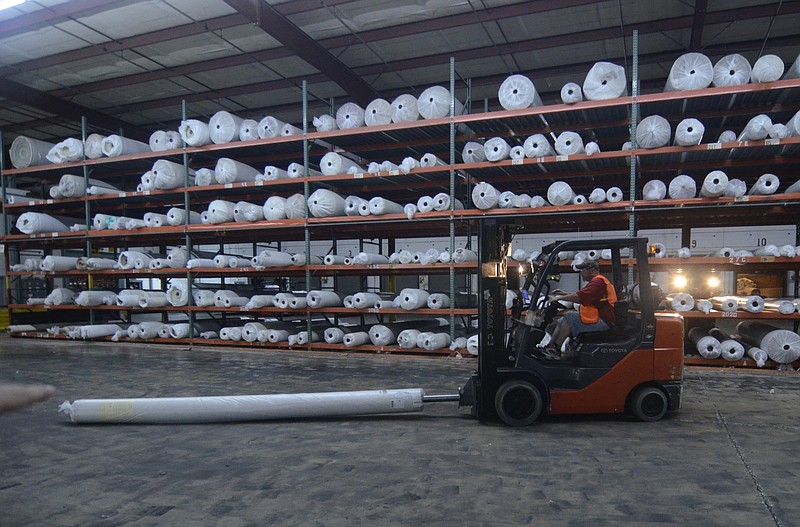After a half dozen corporate and plant acquisitions in as many years, the Dixie Group said Wednesday it has completed its facility restructuring and returned to profitability in the second quarter.
To sustain the recovery, the Chattanooga-based carpet maker also announced it is entering the hard surfaces flooring market by adding a new luxury vinyl tile (LVT) line in its Masland Contract division. Expanding beyond carpet for the first time should help Dixie capitalize on the growing preference by many consumers for wood or tile flooring rather than carpet, which has shown an unexpected decline in overall sales so far this year.
"This is a major change in thinking for the company," said Tom Spiro, an analyst who follows the Dixie Group for Spiro Capital.
Dixie CEO Dan Frierson said carpet shipments have not kept pace with the overall housing recovery this year and adding LVT products should help Dixie to serve a broader part of the flooring market for commercial customers.
"We do believe that having LVT in our commercial business will enhance our position with carpet as well," Frierson said. "It makes us a more full service supplier."
Dixie history
› 1920 — Began as Dixie Mercerizing in Chattanooga› 1990s — Transitioned from textiles to carpet› 2003 — Launched Dixie Home for the upper residential line› 2005 — Launched modular tile carpet line› 2007 — Launched wool products in Masland and Fabrica for high-end designers› 2012 — Purchased colormaster day house to lower cost and Crown rugs to make wool rugs› 2013 — Purchased Robertex for wool carpet manufacturing› 2014 — Purchased Atlas Carpet Mills for high-end commercial business and Burtco for computerized yarn placement in hospitality industry› 2016 — Began selling luxury vinyl tile (LVT), the first entry into hard surface flooring
Frierson said Dixie "looked at a lot of different ways to enter the hard surface market" through acquisition or developing its own product, particularly LVT.
"We will later be announcing that we're doing something similar on the residential side," Frierson said.
In a conference call with analysts, Frierson said residential carpet shipments in the industry are down 5 to 9 percent this year and commercial carpet sales are also down slightly from a year ago despite the improvement in housing starts and the rise in overall commercial building and remodeling activity. At Dixie in the second quarter, residential carpet sales were down 2.3 percent and commercial carpet sales dropped by 8.1 percent from a year ago.
Despite that decline, however, the Dixie Group more than tripled its income from operations during the second quarter of 2016 compared with the same period last year. Dixie also beat analysts' expectations for profits during the period.
The Chattanooga-based carpet maker said its income from continuing operations was $1.6 million, or 10 cents per share, on net sales of $105.3 million, in the second quarter of 2016. In the same period a year ago, Dixie reported operating income of $516,000, or 3 cents per share, on sales of $110 million.
The profit results beat analysts expectations by 18 cents per share. According to Zacks Investment Research, the consensus forecast for the quarter was for Dixie to lose 6 cents per share from continuing operations.
Top carpet makers
The biggest carpet manufacturers in 2015 based upon carpet sales last year were:1. Shaw Industries, $3.2 billion2. Mohawk Industries, $2.65 billion3. Engineered Floors, $540 million4. Interface, $520 million5. Beaulieu, $504 million6. Dixie Group, $419 millionSource: Floor Focus. Carpet includes sales of carpet as broadloom, modular tiles and rugs but does not include hard surface flooring such as wood, laminate and ceramic floor tile.
The second quarter profits also were in sharp contrast to loss of the $4.8 million, or 30 cents per share, that Dixie booked in the first quarter from continuing operations.
In response to the improved results, shares of Dixie jumped by more than 16 percent Wednesday, or 54 cents per share, to close at $3.91 per share in trading on the Nasdaq exchange.
Dixie CEO Dan Frierson said the company has cut expenses and improved operating margins to offset what he said is a weaker market for carpet. The company took at $401,000 additional charge in the second quarter for restructuring charges, but company officials said the consolidation of the company's business and plant acquisitions is now finished.
"Completing the restructuring allowed us to bring more production into our operations, which had a positive impact in many ways," Frierson said. "It allowed us to lower our cost structure through better running conditions and better capacity utilization. In the quarter, we had significantly lower quality costs as our new associates became more experienced and have learned to produce product to a very high standard."
Frierson said the company has had "a concentrated cost reduction plan in almost all areas of sales and adminstration" to improve profit margins while cutting the company's debt.
The restructuring has taken longer and cost more than initially anticipated, Frierson said. But over the past seven years, Dixie has doubled in size - 79 percent of which has come from organic growth and the rest through a half dozen company and facility acquisitions. Dixie's growth has far outpaced the industrywide growth of only 9 percent, Frierson said.
"You might say we're now feeling more comfortable in our new skin," he said. "We have completed our facility consolidation plan - thank goodness. Our quality is back in line with expectations and our service is back to more normal levels."
Frierson said opportunities for growth are bigger in the hard surface market at this time.
"Looking forward, we believe the opportunities for strong growth like we have experienced over the last few years will not be as great in the carpet market," he said.
Contact Dave Flessner at dflessner@timesfreepress.com or at 423-757-6340.

